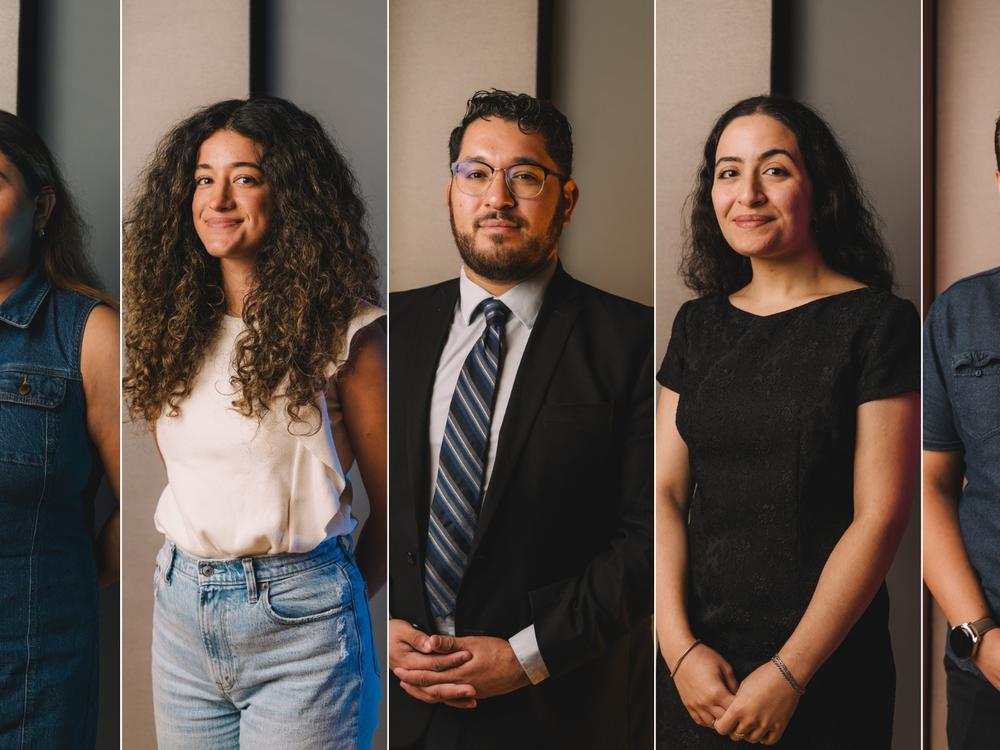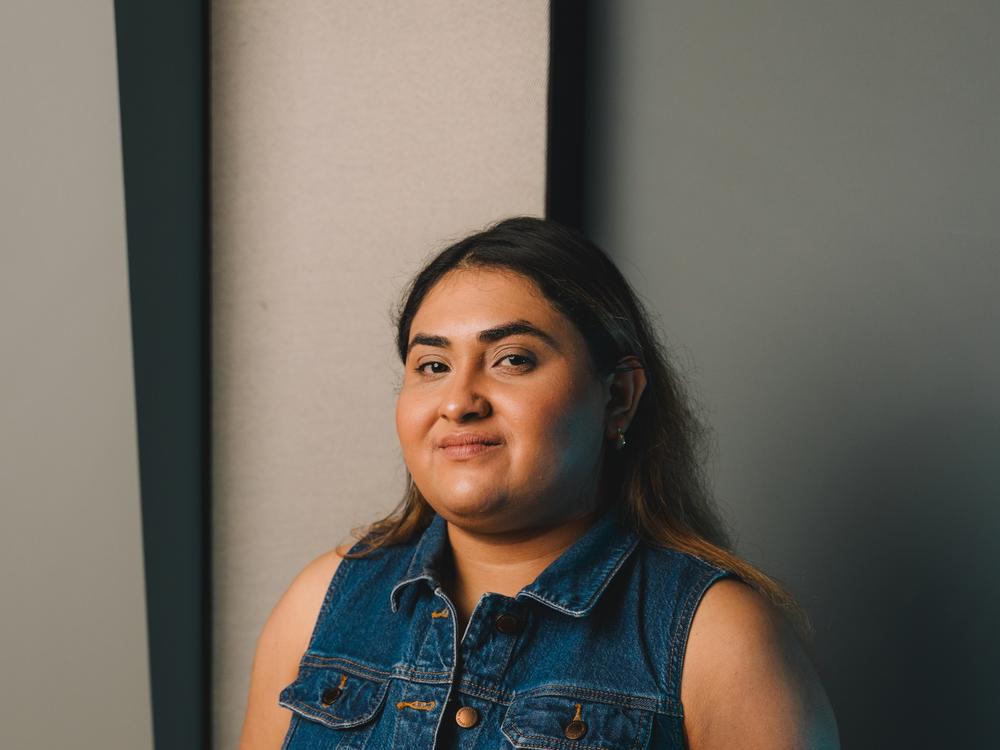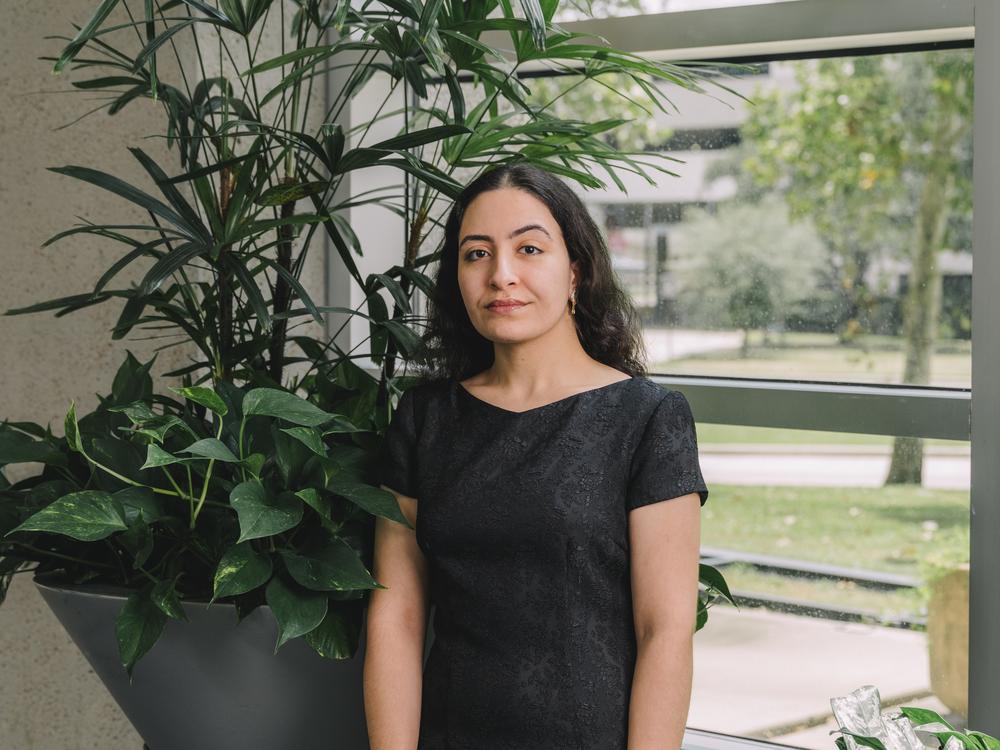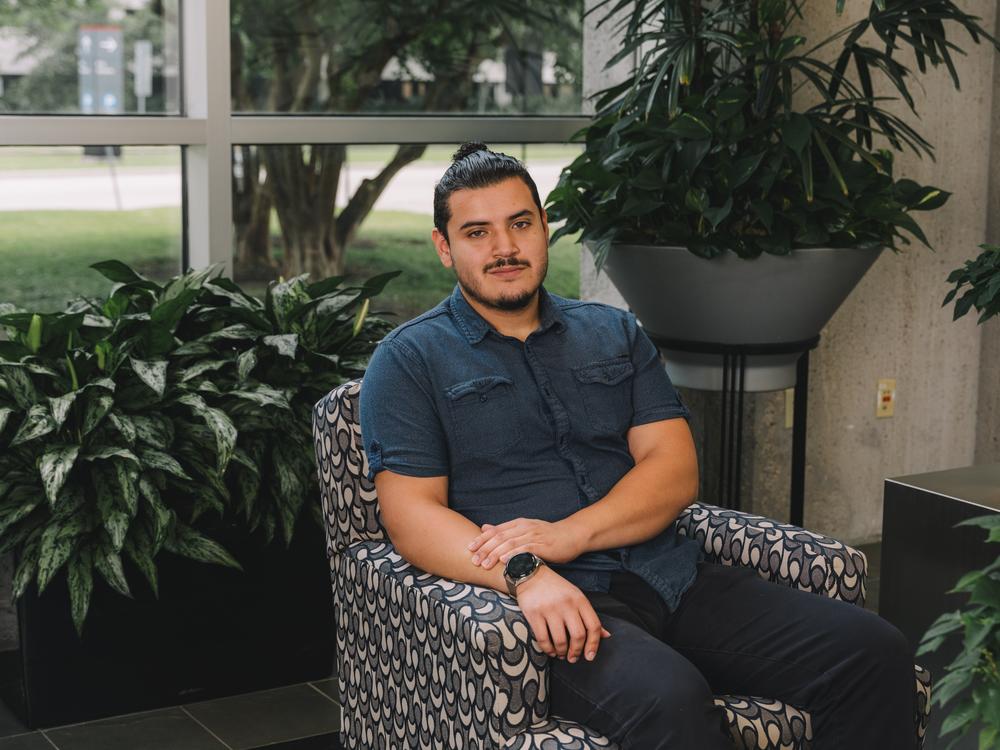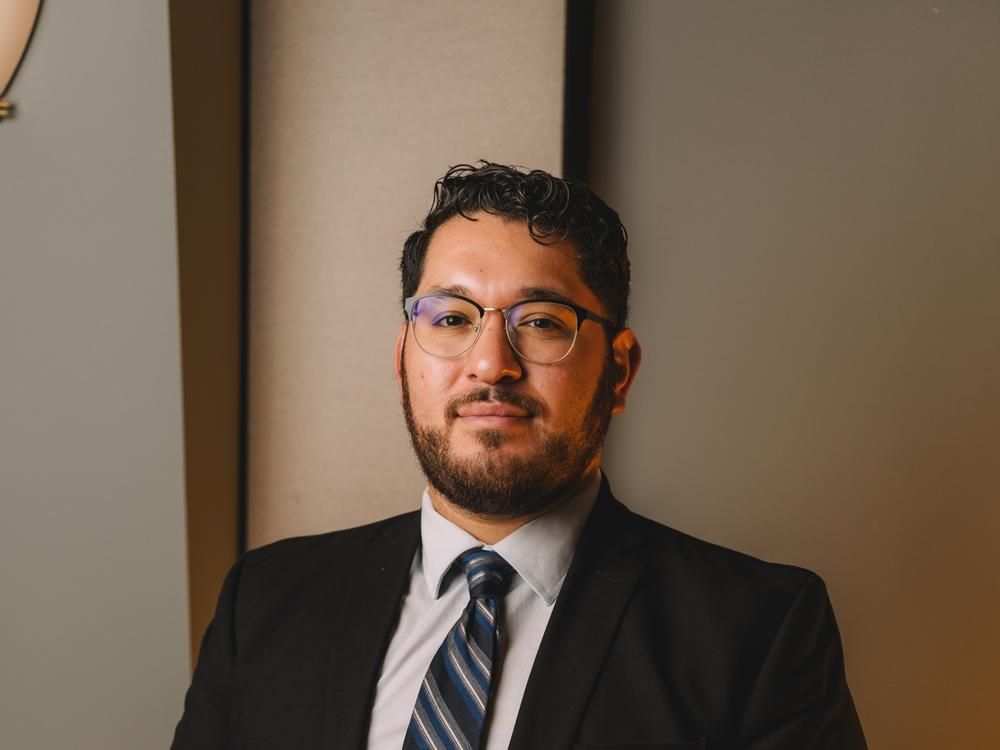Section Branding
Header Content
How growing up in the U.S. immigration system shapes how these young Americans vote
Primary Content
As Vice President Harris charts the course for a campaign that tries to avoid the missteps of her predecessor, President Biden, she may inherit some of his baggage with the groups she most needs to win over.
Voters under 30, for example, backed Biden in big numbers in 2020. But, as polling reflected, he has struggled with the group throughout his presidency.
Support from another major part of Biden’s winning coalition — voters of color — had also frayed in differing amounts for different reasons. One such group that has struggled with Biden’s policies are those who have experienced the U.S. immigration system.
Former President Donald Trump has made immigration the cornerstone of his platform, publicly disparaging and attacking immigrants since he first announced in 2015. He’s vowed to carry out historically large deportations, but how those pledges would be implemented is unclear.
Republicans have repeatedly criticized Biden for upticks in border crossings during his presidency. But Biden’s immigration policy has been complicated. In June, the president restricted border crossings, including for people seeking asylum, via executive order. Weeks later, he took steps to increase relief for undocumented people and recipients of the Deferred Action for Childhood Arrivals (DACA) program.
In February, the White House and congressional leaders also came close to agreeing on a bipartisan bill that would have increased restrictions on the border, but it failed after Trump urged Republicans to reverse course and oppose it.
Biden’s willingness to work with Republicans on the legislation alarmed immigrant advocates and organizers, including Nicole Melaku of the National Association of New Americans.
“It's going to be a really hard recovery to build back the trust of the immigrant constituency,” she told NPR in an interview before Biden announced he would be dropping out of the presidential race.
As part of its focus on new voters, NPR spoke to five young people under the age of 30 who have all existed within the immigration system and discussed how their upbringings affect their politics today.
Lucero Lopez, 29, is a natural-born citizen whose parents came to the U.S. undocumented. Her father has since become a citizen, and her mom has legal status, but Lopez also has two older sisters who haven’t been able to leave Mexico. This has placed a financial and emotional burden on her.
“I never understood, why always me?” she explained. “I didn't understand that I was the one who had to take care of [my parents] and still is taking care of them.”
Josue Rodriguez, 28, immigrated to the U.S. from Mexico when he was a child. He is a recipient of the Deferred Action for Childhood Arrivals (DACA) program. Rodriguez now dedicates his work to helping people who are homeless, something he experienced with his family.
“That really has been what's driven me,” he said. “How can we look at public policy and understand their impacts? Make sure that we have lived experiences within that space.”
Raneem Le Roux, 27, and her family immigrated to the U.S. from Syria. She was able to get naturalized as a child but also went on to help her father, who struggled to pass the citizenship test.
“I would burn CDs for him, telling him the questions in English and the answers in English, and then translating them in Arabic,” she recalled. “He used to do trucking, so he used to drive at night and just listen to them.”
Jasmine Parish Moreno, 23, is the child of Iranian and Mexican immigrants who both spent more than a decade navigating the U.S. immigration system before eventually becoming citizens. Her father was able to vote for the first time in 2020, which was also the first year Parish Moreno was eligible to cast a ballot.
“I think for years afterwards [he] carried his ‘I voted sticker’ like on his phone case because he was so proud of it,” she said.
Jossue Ureno, 22, is a natural-born citizen whose parents first immigrated from Mexico more than 20 years ago. They are still undocumented, and he spoke about how their status has limited their ability to be with family back in Mexico, describing when his dad had to watch a family funeral over the phone.
“Seeing the heartbreak in his eyes of him wanting to be there but not being able to be there,” he said. “Not being able to have one last goodbye, especially since he hadn't seen them for like over ten years, was definitely something that, it still sticks with me.”
Read more of their conversation below. These responses have been edited for clarity and length.
On voting this year
Of those in the group eligible to vote in 2020, all cast their ballots for Biden, though several were disappointed in aspects of his leadership and cautioned Harris to set a different path.
Some argued that Biden’s handling of issues related to immigration and the U.S. response to the Israel-Hamas war have made it difficult to immediately support Harris. But for these young people, voting is essential.
Le Roux: As someone who voted for [Biden] in hope of protecting my community, my family and immigrants in the U.S., he failed. … I can only hope that Harris at least learns from those mistakes … I'm very torn because part of me doesn't want to vote for a nominee that continues to profit and encourage foreign policies that result in human costs and dead bodies that look like me. But at the same time, I don't want the minimal protections I do have for me and my partner, both in terms of her immigrant status and LGBT protections, to be lost.
Moore: I've talked to folks around the country, young people who lean Democratic, … who were debating sitting out of this race when it was Biden versus Trump. … How does the idea of skipping an election or skipping the top of the ticket feel to you?
Parish Moreno: We can't afford to sit this out. We're in a unique situation because we've seen already what the Trump presidency was like. … And so to sit this race out would be to kind of gamble with it and risk returning to that.
Moore: Raneem, I see you nodding.
Le Roux: Yes, I am nodding because I do agree for the most part with you, Jasmine … It's our responsibility and in our community's interests, all our communities, immigrants, as women, as members of the LGBT community, to ensure that Trump doesn't get elected.
On Trump and his political impact
While these young people generally don’t support Trump, they come from families who have different political opinions on how another Trump presidency could affect their communities.
Parish Moreno: Just because my parents are now citizens doesn't take away the fact that they were immigrants, doesn't take away the fact that my dad's a Muslim man in America, doesn’t take away the fact that under the Trump presidency, my family wasn't able to come visit because of the Muslim ban that Trump enacted. … I'm a first-generation American. So I try to tell in my head that I have every right to take up space and to speak and have my voice heard as someone who is like a 10th-generation American, but it’s hard.
Ureno: I find this to be a very tough question. … After now going through a Biden presidency, my parents themselves have actually said to me and my brothers, … ‘When Trump was in office, inflation was down. Everything was cheaper. It seemed to be like the world, the United States was more at peace.’ … My parents feel that because of the situation that's going down in the southern border, that that's actually hindering them. And so because of that, they're like, honestly, Trump, he handled it better. … Now that Harris is running, I don’t know what their stance is.
Moore: Your parents are still trying to become citizens here. They're not. Trump has threatened to deport millions of people. And how does that square with them?
Ureno: My parents are like, he's just fear mongering, he's just pandering. He's trying to get the vote. They don’t really – they're like, ‘You said it the first time you didn't do it with the unified Congress. How are you going to do it this time?’
On what they want from politicians moving forward
Lopez: They always use [immigration] as a pawn. We are not pawns. We are people.
Rodriguez: We know that there's more asylum claims coming through the border. What are their stories? They don't talk about their stories. They just talk about the numbers. … I wish the Democrats would call the bluff that the Republicans are doing so that we can start humanizing people.
Moore: If you had to meet with [Harris,] what would be your message to her?
Lopez: Call for a cease-fire. Immediately. That's the one thing that I will say.
Parish Moreno: I know, especially with Joe Biden, there was a lot of minority communities that were mobilizing to get him elected. So, just don't forget who got you into that power seat.
Ureno: Bipartisanship. That’s how you get stuff done in Congress. If you want to see real results, sometimes, you may not like it, but that's how politics works. You got to work with the other party to get stuff done.
Moore: Was there an issue that we didn't hit on?
Rodriguez: I would just mention like, with deferred action, DACA. The program itself is technically ending and we're waiting on a court ruling. So, just kind of putting that at the forefront, too, that I could become undocumented tomorrow if the court goes against it. So I just kind of want to make sure that that's still at the forefront of the conversation.
On what voting means to them
Lopez: For me, it's such a weight. I have my aunt, she's an immigrant, and she's the one who's always, like, go vote for me. You – I know, sorry. But just hearing it from her because she can't do it. That's why it carries so much weight for me.
Rodriguez: The one link I have on my Instagram is how to register to vote. So that tells you that, yes, voting is very dear and near to me. … I know in my bones that one day, I'll be able to vote. But even now, I mean, it's getting to the point where friends come to me for suggestions or for just insights into people running for office. And I'm blessed to be an asset to them. And I like to think that through me and my opinions and my standpoints, they've been able to be educated. And I'm comfortable with that for now.
This conversation was recorded at Houston Public Media, with engineering from Todd Hulslander of Houston Public Media.
